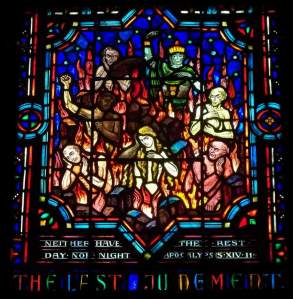Out of Darkness
Approximately 1,000 calls a day come in to the ministry where I once worked as a prayer counselor. I was on the midnight shift, so we heard from the night owls, the insomniacs, the lonely and distressed. There were prank calls, crank calls, and downright obscene calls, of course, but most were heartfelt and some were gut-wrenching ones: The widow whose husband and father-in-law both died this year; still grieving and wrestling with probate issues, she recently lost her job and is about to lose her house. The alcoholic who just accepted Christ and wanted us to know he’s been clean and sober for an entire week for the first time in his adult life. The distraught woman, alienated from her one and only child, cut off from all contact with her grandchildren; she doesn’t even know where they live now. The Christian who’s literally lost everything, who has nothing left except $2 to his name, and figured: what the heck, might as well give that $2 to God.
There is something deep in the human psyche that makes us call out to God, sometimes in joy and thanksgiving and even more frequently in our pain and fear. This is a universal phenomenon, cutting across all cultures, ethnicities, and geopolitical boundaries. Differing religions tell us how to do it, differing schools of psychology hypothesize why we do it, only atheists say we don’t really need to do it. But assuming there is objective reason to reach out to God – and, admittedly, some would say this is a huge assumption – it naturally follows we are under obligation to God. We have a duty to obey the divinely inspired moral standards.
If, however, this is a false assumption – if there isn’t even a God or god or gods at all – are we under any kind of obligation to anything other than our own individual whims? Is there any “real” right or wrong at all? As Francis Schaeffer asked, how should we then live?
 Interestingly, there are hints of cause-effect relationships that could, just possibly, support a godless morality which is both workable and universal (i.e., applicable to all humanity). Recently, researchers Leslie Martin and Howard Friedman at UC Riverside did a longitudinal study 1,500 individuals who were over 80 years of age in hopes of discovering the underlying causes of longevity. In the process they inadvertently discovered a consistent trend: individuals who were on a consistent basis characterized as both “thoughtful” and “kind” turned out to be the happiest and healthiest, while conversely those who were not were much more likely to have engaged in addictive behaviors, performed poorly at work, had failed marriages, and were overall less happy and less healthy. This pattern was found to be true regardless of income level or intelligence. To a theist, this reinforces the idea the Creator designed a reward mechanism into creation; the atheist would say this mechanism was selected as an evolutionary advantage.
Interestingly, there are hints of cause-effect relationships that could, just possibly, support a godless morality which is both workable and universal (i.e., applicable to all humanity). Recently, researchers Leslie Martin and Howard Friedman at UC Riverside did a longitudinal study 1,500 individuals who were over 80 years of age in hopes of discovering the underlying causes of longevity. In the process they inadvertently discovered a consistent trend: individuals who were on a consistent basis characterized as both “thoughtful” and “kind” turned out to be the happiest and healthiest, while conversely those who were not were much more likely to have engaged in addictive behaviors, performed poorly at work, had failed marriages, and were overall less happy and less healthy. This pattern was found to be true regardless of income level or intelligence. To a theist, this reinforces the idea the Creator designed a reward mechanism into creation; the atheist would say this mechanism was selected as an evolutionary advantage.
On the basis of this study alone both Believers and non-believers could argue “thoughtfulness” and “kindness” are behaviors – virtues – that can and should be promoted across society. And yet … what if members of society aren’t persuaded by the latter’s appeal? There is no ring of “Thou Shalt;” it is merely advice: act this way because it’s good for you. And if we have learned anything from prohibition, anti-smoking campaigns, and US obesity levels now at epidemic proportions, it is that huge numbers of people do precisely what they know is not good for them.
When atheists propose a concept of morality, they are undercut by their own presuppositions. Sam Harris, for example, attempted to come up with a godless morality a few years back when he published The Moral Landscape. His attempt fails, of course, for the very reason (this he readily admits) scientists and ethicists before him abandoned the effort to come up with irreligious principles of behavior. In the absence of a deity – an objective third party, so to speak – there are no virtues or values which are not purely subjective.
Harris tries to appeal to utilitarianism – what works for us should be “moral” and what does not work is “immoral.” But what if lying and stealing work for you? The only appeal is to the majority. The majority of Americas (for now) object to child brides and genocide, for example, but majorities in other societies heartily approve of those things, and irreligious people can’t say they’re wrong for doing so. And on what reasonable basis can anyone claim the majority is right? There isn’t one! At the individual level, there is no rational, consistent way to say a serial killer or child molester is wrong.
How can anything be definitively right or wrong? If, after all, we are merely the result of a purely random chain of events, not only is there no absolute standard for human behavior, there is no ultimate meaning, purpose, or value to human life – or art, beauty, love, or anything else, for that matter. As Dawkins put it,
“The universe we observe has precisely the properties we should expect if there is, at bottom, no design, no purpose, no evil, no good, nothing but blind, pitiless indifference.”
In other words, who you are and what you do matter not at all. You are an accident of nature, and the universe – existence itself – is fluid, defined purely by what you personally think and feel at any given moment. Moreover, everything you think and feel – everything that makes you “you” – will be forgotten within a few generations.
If Harris and Dawkins are correct, you do not matter. If they are wrong, you do. That’s it. There is either God or nothing. Hope or despair. There is no middle ground. If God does not exist, then this universe, for all its wonder and mystery, is little more than a cage, and, ultimately, a mausoleum. If there is no God, then Eugene O’Neal was correct when he wrote,
“Life’s only meaning is death.”
Ah, you say, but WHICH deity is the right one, you ask. Which of the various religions has got it right? Whom do I follow? These are fair questions, and I assure you the Deity in question is smart enough and competent enough to get through to you. But you have to pursue him.
“You will seek Me and find Me when you search for Me with all your heart. I will be found by you,” declares the LORD. – Jeremiah 29.13-14a
Picture this: You are standing on the edge of a crumbling precipice projecting above a vast black pit (atheism). Behind you is a guard rail (agnosticism), and beyond that, a road (faith). Back away from the ledge and cling for dear life to that fence – but only long enough to catch your metaphorical breath. Don’t stay there; get down from that fence and walk the road until you find where it leads. That’s what I did, many years ago, and you can, too.

